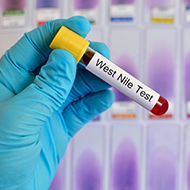
BEVA issues reassurance after a horse contracts the disease while competing in Spain.
The British Equine Veterinary Association (BEVA) has reassured horse owners that there is 'no need for alarm' after a case of West Nile Virus (WNV) was identified in the UK.
On Monday (6 November), a seven-year-old warmblood mare was diagnosed with a neurological condition brought on by WNV infection. The horse had recently returned to the UK after competing in Spain and was immediately transported to a leading equine hospital.
BEVA says that, because of the time frame, the virus was 'almost certainly' acquired in Spain and grew worse when the horse returned. The horse is said to be recovering well at home, with BEVA adding 'there is no risk of onward spread within the UK.'
A BEVA spokesperson said: “West Nile Virus is a notifiable disease because of the threat it poses to human health. However, this case need not prompt alarm as the infection does not spread from horses to other animals or people.
“Although horses can become very sick, and even die, when they become infected, they have very low levels of virus circulating in their bodies, insufficient for the infection to be transmitted.”
Despite its prevalence across Southern and Eastern Europe, this particular case of WNV is only the second to be detected in Britain. The first was identified in a horse that arrived in the UK from Europe in 2013.
The virus is spread primarily by mosquitoes, and with rising global temperatures, experts predict that spread of WNV to Northern European Countries, like the UK, is becoming increasingly possible.
In light of the discovery, BEVA is urging horse owners to remain vigilant for the signs of WNV in their animals, including muscle tremors, weakness, stiffness, ataxia and potentially recumbency. Vaccines are available in the UK and are of value when travelling to countries where WNV is common, such as Southern and Eastern Europe and The Americas, the association said.



 The Federation of Independent Veterinary Practices (FIVP) has announced a third season of its podcast, Practice Matters.
The Federation of Independent Veterinary Practices (FIVP) has announced a third season of its podcast, Practice Matters.